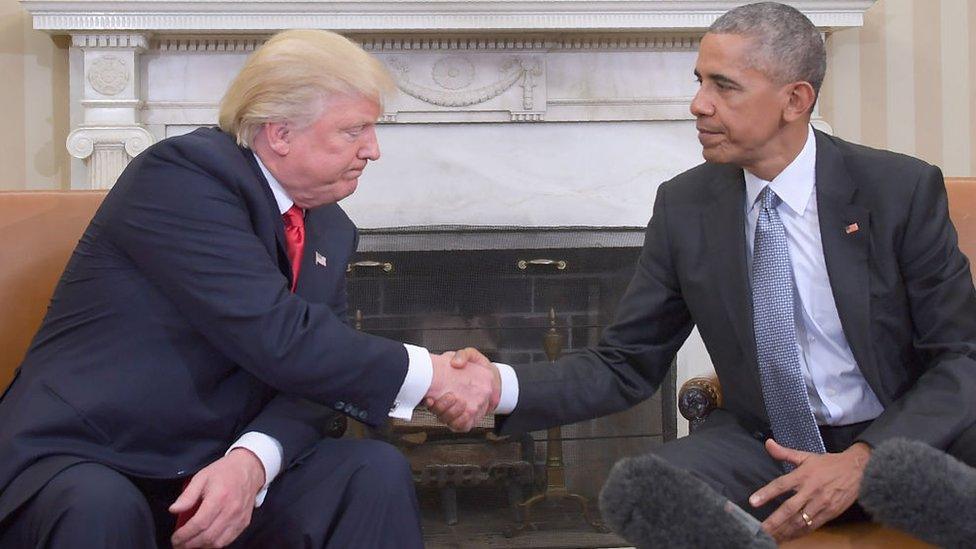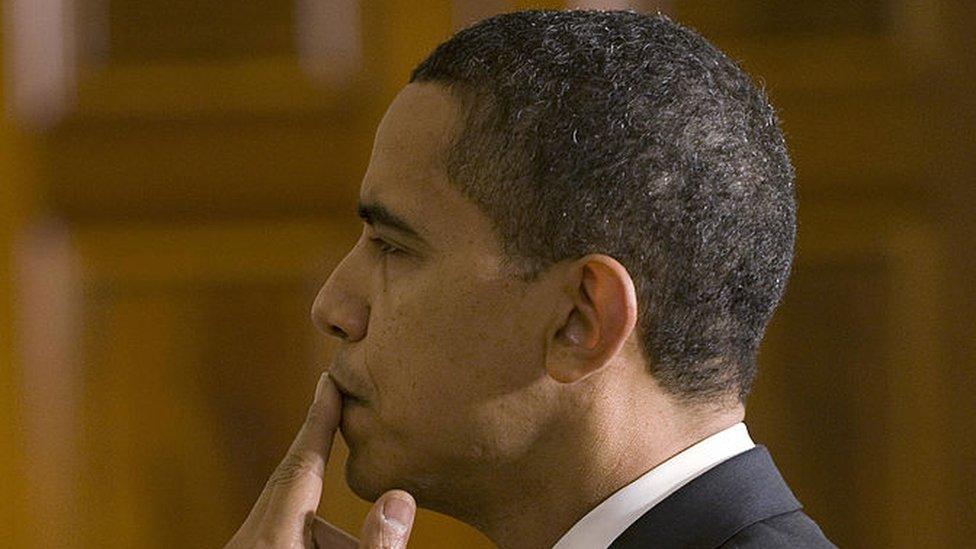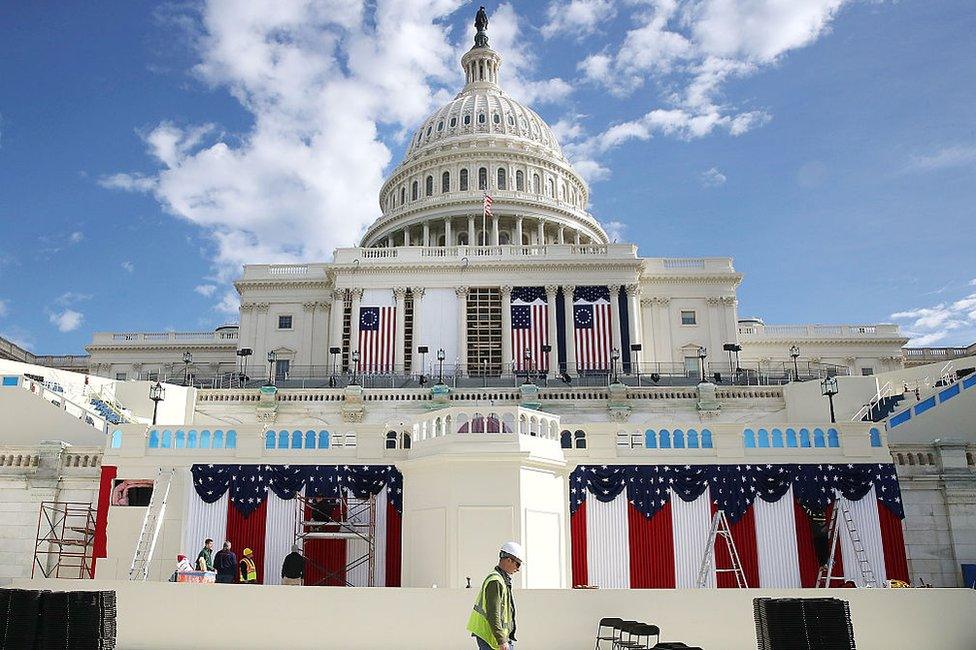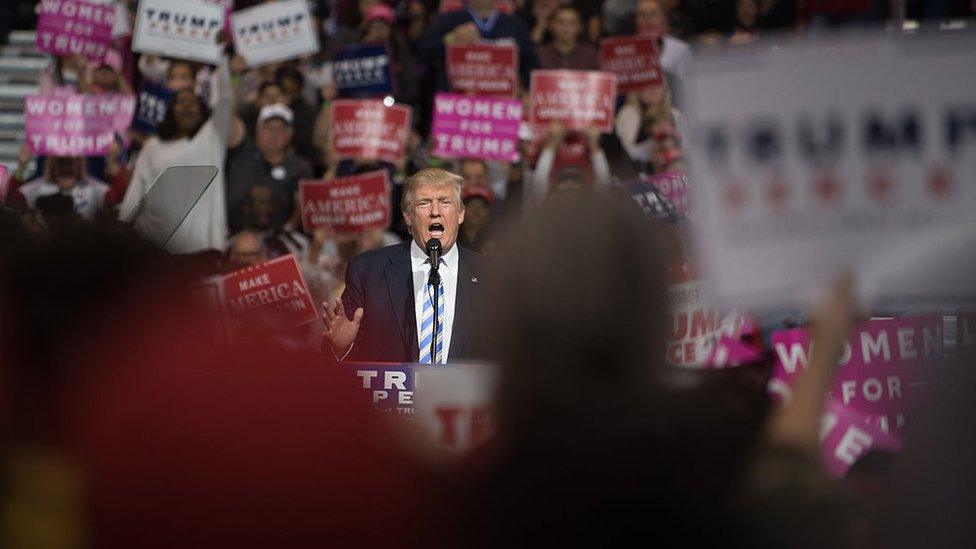Trump and Obama: Two characters in search of a legacy
- Published

So the pendulum swings again. They are polar opposites, inversions, thesis and antithesis, from the skinny kid with the funny name to the old guy with the funny hair, chalk to his cheese. It says a lot about the Disunited States of America that two such different brands are its best-selling political products.
In his final week, President Barack Obama's many admirers are determined to behave with the brittle exaggerated optimism of mourners at a wake, determined to celebrate the achievements of a dear friend, rather than wail over his absence. They may even convince you it is hope that makes their eyes glisten so brightly.
Their love - not too strong a word - for this man they mourn begs the question: "What achievements, what legacy?"
And in what way did he fail? For Democrats can blame turnout, blame Twitter, blame Hillary Clinton, blame fake news, but surely the failure of his party to get a third term in the White House was in some sense Mr Obama's responsibility? As he said, his name wasn't on the ballot, but his achievements were.
This goes to the heart of a question about character: his, Donald Trump's, most importantly their country's sense of self.

President Obama often appeared to be deep in thought
From the moment of his first victory in 2008, President Obama was pinned in place by America's horrible history.
Even extraordinary actions would struggle to escape the orbit of the mundane, buried under the weight of that primary achievement.
The first line in the encyclopaedias would always be: "The USA's first black president." So it has come to pass.
But few, eight years ago, expected him to be followed into the White House by someone who is in every respect his opposite.
You could argue President Obama has no legacy, the achievements of eight years already lie shredded by the election of Donald Trump.
Mr Trump has indeed promised to undo Obamacare, the Iran deal, the Paris climate change deal, new environmental rules and regulations and much else that he has derided as "horrible".
But we can't really judge Mr Obama's legacy until we know how profoundly it will be undone.
This will be important.
How history sees Barack Obama depends on Mr Trump, in more ways than one.
Because this is about character, charisma and storytelling.
For a masterful writer, for a man who quite literally wrote his own tale long before others could define him, it is sobering the way Mr Obama lost control of the narrative in the White House.
What were seen as positive qualities, a relief and a reaction after George W Bush, looked less favourable to some as time went on.
Thoughtfulness seemed like dithering, eloquence became loquaciousness, "no drama Obama" wasn't the soap opera some in the American public craved.
Mind you, there was no massive switch thrown where most of America changed its mind.
The votes involved were comparatively few: this is still the old story of two Americas, as different as Donald Trump and Barack Obama.
Mr Obama is cool, Mr Trump is hot. Indeed, Mr Obama is cool when Mr Trump is not. He's deliberative, Mr Trump is instinctive. Mr Trump is angry where Mr Obama is preternaturally calm.

Donald Trump's inauguration takes place against the backdrop of a divided US
One suspects Mr Obama walking alone in the Rose Garden conducts several inner monologues at once, we know Mr Trump blasts out his first thoughts in 140 characters on Twitter.
Mr Trump would eat crocodiles and drink vinegar, external while Obama soliloquises on maybes and might-have-beens.
If US politics was a Western, Mr Obama would be the magical preacher, mystically advocating collective action, Mr Trump would be charismatic snake oil salesman, shouting from the side of the wagon, captivating, infuriating and embodying a certain sort of frustration.
We don't know whether, when the black hats ride into town, he'll surprise us all with heroic feats, or be discovered cowering under the saloon counter.
But Mr Trump is already much closer than Mr Obama to an American archetype - the boaster -bumptious, self-confident, quick to anger, but with a confidence and optimism in his own abilities, which respect no horizons.
What is attention-grabbing is when the horizons have to buckle and broaden and widen in the face of that force of will.
Mr Trump is the embodiment of the sort of America who shocks Europeans: brash and vulgar and unsophisticated.
Many in the US, particularly on the coasts and in the cities, share that horror.

But the truth is this is a deeply divided country.
Mr Trump speaks for those other Americans who felt Mr Obama never did.
When Mr Obama says:, external "The great American hero - Lincoln - could see the fundamental contradictions of the American experiment clearly," they can't.
They didn't want nuance.
They didn't want empathy towards other cultures and religions.
They didn't want, in the end, cool.
They want righteous fury and clear promises to do something dramatic to make it stop hurting - whatever "it" is.
Two Americas face each other, watching their new president.
Most are nervous, expecting a rollercoaster ride.
Many are hopeful.
These are an optimistic people, and he is, after all, not a passing politician but their head of state, the person who embodies their country.
Even those who want him to fail, want their country to succeed.
In mining country, in West Virginia, I was struck by those who had hope for a new future under a new president.
Not faith, not trust, but hope, some what shop-soiled and held together with gaffer tape, but hope nonetheless.
That, at least, is similar to 2008.
But what the first line of Mr Trump's biography says is not defined from the first day.